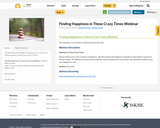
The following is a collection of Happiness Webinars given during school closures on how we can find happiness in these crazy times!
- Subject:
- Education
- Material Type:
- Primary Source
- Date Added:
- 04/03/2020

The following is a collection of Happiness Webinars given during school closures on how we can find happiness in these crazy times!

"Chelsea grew up on a mixed grain and dairy farm west of Winnipeg, Manitoba. Her dad and uncle manage the farm, and all the kids help out where they can. The busy family is all too familiar with the stress and anxiety that is created when you work where you live and there is a never-ending list of jobs to be done. At the age of 46 Chelsea's dad, Rob, suffered a heart attack brought on by the stresses of farming, and it took that life-threatening event for the family to realize something had to change.
According to research conducted by the University of Guelph 45% of Canadian farmers are classified as living under high-stress conditions and 58% met the criteria for anxiety classification. Thankfully organizations like the Do More Agriculture Foundation are bringing awareness to the fact that farmers, like all Canadians, need to be empowered and supported to take care of their mental wellness."

Helping children learn to be smart about feelings can help alleviate their emotional stress, improve concentration, boost their immune system, and enhance brain development. This First Aid for Feelings workbook for children was designed to help do that. By using the simple coping strategies found in this workbook, you can encourage children to express thoughts, questions, and feelings. These life skills may help reduce and manage children’s stress or anxiety, and provide some sense of control within their changing lives.
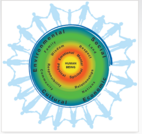
The First Nations Perspective on Health and Wellness aims to visually depict and describe the First Nations Health Authority Vision: Healthy, Self-Determining and Vibrant BC First Nations Children, Families and Communities.
This visual depiction of the Perspective on Health and Wellness is a tool for the FNHA and First Nations Communities. It aims to create a shared understanding of an holistic vision of wellness. This image is just a snapshot of a fluid concept of wellness: it can be adapted and customized freely and is not confined to remain the same.

"The First Sixteen is Agriculture and Agri-Food Canada's new podcast series that explores the freshest ideas in agriculture and food. Each episode explores a single topic in depth—digging deep into new practices, innovative ideas, and their impacts on the industry. Learn about Canada's agricultural sector from the people making the breakthroughs and knocking down the barriers! Farmers and foodies, scientists and leaders, and anyone with an eye on the future of the sector—this podcast is for you! A new episode is published each month." Agri-Food Canada
This link goes specifically to Episode 013- Mental Health: From the Farmer's Perspective

This resource contains two documents from the SK Ministry of Education: Priority Action Plan - contains crucial (foundational) outcomes for literacy and numeracy for Grades 1-9. Reconnect - provides suggestions and other considerations for reconnecting during the pandemic and disrupted learning.
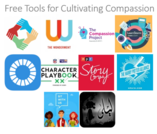
These websites/apps for cultivating compassion are completely free! Teaching ToleranceThe WondermentThe Compassion Project Learn Storm SDG's in ActionCharacter Playbook Story Corps Sit with Us The Harry Potter Alliance Liyla and the Shadows of War

Explore and understand the mental health issues that affect young people with these online courses from FutureLearn.

Worry and Rumination
While worrying and feeling nervous is something that all human beings experience, as with many things in life, too much of something may not be good for you. Normal anxiety can become a problem when it is excessive, feels uncontrollable, is experienced as intrusive in your life, is persistent (seeming to always be around), and causes you significant distress, or impairs your ability to go about your day-to-day life. This is when normal anxiety becomes generalised anxiety disorder.
One of the important features of generalised anxiety is that the worry and anxiety is spread across a number of different areas such as health, work, interpersonal relationships, finances, and so on. This makes it different from other anxiety problems, such as social anxiety or phobias, where nervousness and worrying are more specific to particular situations.
**Site includes workbook, worksheets and information sheets for download.
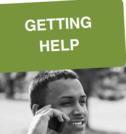
Asking for help for mental health support and stigma's attached. Building Your Support Team. Psychaitrist, Family Doctor, Psychologist and counsellor, community health organizations

This site is a list of the Community Mental Health and Addictions Services in the province of Saskatchewan organized by Health Region.
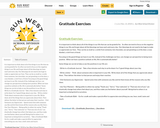
It is important to think about all of the things in our life that we can be grateful for. So often we tend to focus on the negative things in our life and forget about all the blessings we have each and every day. Our blessings do not need to be huge to make us appreciate our lives. They can be as small as: a smile from someone, hot chocolate, our pet greeting us at the door, a cozy blanket, a visit from a friend.
Focusing on the good things we have in our life, instead of the challenges we face, can change our perspective to being more positive. When we have a positive outlook on life, life is automatically better!
Some things we can do to help us see the positives in our life are:
- Write in a Gratitude Journal - Take a few minutes each day to write down 4 or 5 good things about your day.
- Write a letter - Think about someone who is important in your life. Write down all of the things that you appreciate about them. Then deliver the letter to that person and enjoy their reaction.
- Visit Someone you Appreciate – Spend some time with someone you like and let them know all the reasons why you like them.
- Use Your Manners – Being polite to others by saying “Thank you,” “Sorry,” “Your welcome” or “That was nice of you” can drastically change how others feel about you, and thus make you feel better about yourself. Being kind to others is as important as being kind to ourselves.
- Take a Gratitude Walk – Go for a walk and make a special effort to appreciate everything you see, hear, smell, taste and touch.
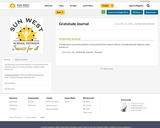
The following is a journal for gratitude. It can be printed off for students to fill out. It includes gratitude, happiness, being grateful, etc.

This is a gratitude journal that your students can use to help build an understanding of themselves.

Time can seem to go very fast and we forget the little things that make us happy. This activity can help you be mindful of all the things that we are grateful for. Make a paper chain to decorate your home or classroom.

What is Grief? What can I do about? How can I help a loved one?

Professor Sonja Lyubomirsky - one of the world's leading Positive Psychology experts - shares the latest insights from her ground-breaking work on happiness....
She focuses on three main habits in this webinar...
1. Gratitude
2. Acts of Kindness
3. Social interactions and connections

Healthline is a great A-to-Z resource for various physical and mental health issues, emphasizing expert content with genuine caring. And you don't need to be under the weather to benefit from this website.
In addition to providing timely, modern health advice, Healthline is a beautifully presented and information-packed resource for your overall health and wellness. At Healthline, you'll find nutritious recipes, workout ideas, fitness and eating tips, and the latest in health news.
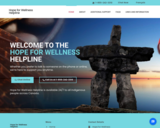
Immediate mental health counselling and crisis intervention for all Indigenous peoples across Canada (available in some Indigenous languages). Toll-free: 1-855-242-3310.
Phone and chat counselling is available in English and French. On request, phone counselling is also available in:
Cree
Ojibway
Inuktitut
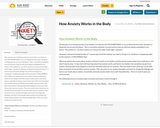
The purpose of us feeling anxiety in our bodies is so that we will ‘DO SOMETHING’ to try to eliminate the event, situation or thing that we are worried about. This is a primitive and basic survival instinct that we still have deeply embedded in our brains. The problem is…we don’t need to run away from saber tooth tigers anymore!
However, instead of having the idea of “I need to get rid of this feeling” we need to change it to “whatever is happening right at this moment, I CAN HANDLE that.”
What we need to do is learn about anxiety and how it works in our bodies and then break anxiety down into small pieces, and take it step by step. It may start with learning about how anxiety works and feels in our bodies; the sensations we get from anxiety. Starting with what happens in our brain and body when we are anxious. Then we need to learn what we can do with those sensations to lessen them and our anxiety. Then we work on our anxious thoughts and work to change the dialogue we have in our heads about anxiety. Essentially we break anxiety down into small chewable bites. This is in order to give you some success.